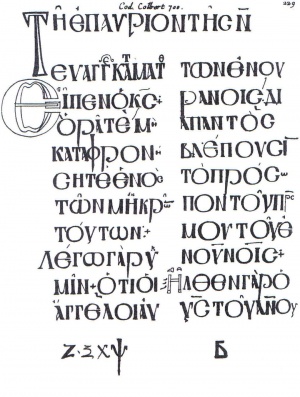Lectionary 1
From Textus Receptus
(→Notes and references) |
(→Description) |
||
| Line 7: | Line 7: | ||
== Description == | == Description == | ||
| - | The codex contains Lessons from the Gospels [[lectionary]] (''Evangelistarium'') with some [[Lacuna (manuscripts)|lacunae]].<sup>[ | + | The codex contains Lessons from the Gospels [[lectionary]] (''Evangelistarium'') with some [[Lacuna (manuscripts)|lacunae]].<sup>[2]</sup> It is written in Greek [[Uncial]] letters, on 265 parchment leaves (30 cm by 24 cm), 2 columns per page, 10 lines per page,<sup>[1]</sup> 7-9 letters per page.<sup>[2]</sup> |
| - | Lessons of the codex were red from Pascha to [[Pentecoste]].<sup>[]</sup> | + | Lessons of the codex were red from Pascha to [[Pentecoste]].<sup>[1]</sup> |
== History == | == History == | ||
Revision as of 23:07, 21 January 2011

Lectionary 1, designated by sigla ℓ 1 (in the Gregory-Aland numbering). It is a Greek manuscript of the New Testament, on vellum leaves.[1]
Paleographically it had been assigned to the 10th century. Formerly it was known as Codex Colbertinus 700, then Codex Regius 278.
Contents |
Description
The codex contains Lessons from the Gospels lectionary (Evangelistarium) with some lacunae.[2] It is written in Greek Uncial letters, on 265 parchment leaves (30 cm by 24 cm), 2 columns per page, 10 lines per page,[1] 7-9 letters per page.[2]
Lessons of the codex were red from Pascha to Pentecoste.[1]
History
History
Formerly it was variously dated. Scrivener dated to the 8th century,[] Henri Omont to the 14th century, Gregory to the 10th century. In the present day it is unanimously dated to the 10th century.
The manuscript once belonged to Colbert.[] It was examined and described by Bernard de Montfaucon,[] Wettstein,[] Scholz,[] Paulin Martin,[] and Henri Omont.[] Gregory saw the manuscript in 1885.[]
The codex now is located in the Bibliothèque nationale de France (Gr. 278).[]
See also
Notes and references
- 1. K. Aland, M. Welte, B. Köster, K. Junack, Kurzgefasste Liste der griechischen Handschriften des Neues Testaments, (Berlin, New York: Walter de Gruyter, 1994), p. 219.
- 2. C. R. Gregory, "Textkritik des Neuen Testaments", Leipzig 1900, vol. 1, p. 387.
- 3. F. H. A. Scrivener, "A Plain Introduction to the Criticism of the New Testament" (George Bell & Sons: London 1861), p. 212.
- 4. Montfaucon, Palaeographia graeca (1708), pp. 228-230
- 5. J.J. Wettstein, Novum Testamentum Graecum (Amsterdam 1751), p. 62
- 6. Jean-Pierre-Paul Martin, Description technique des manuscrits grecs, relatif au N.T., conservé dans les bibliothè des Paris (Paris 1883), p. 137-138
- 7. Henri Omont, Fac-similés des plus anciens mss. grecs de la Bibliothèque Nationale du IVe and XIVe siècle (Paris, 1892), 21.
Bibliography
- Henri Omont, Fac-similés des plus anciens mss. grecs de la Bibliothèque Nationale du IVe and XIVe siècle (Paris, 1892), 21.
